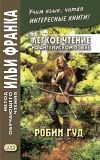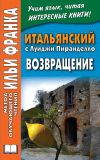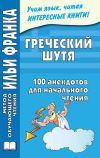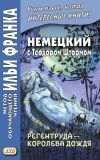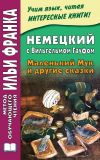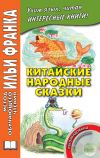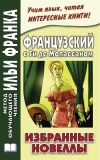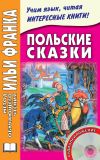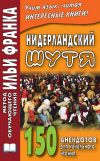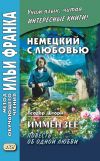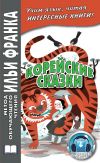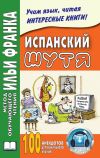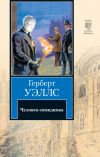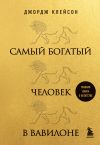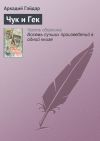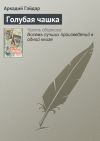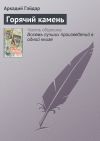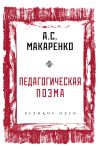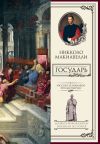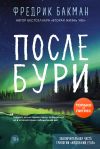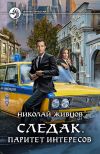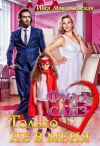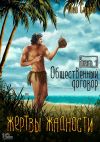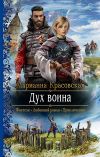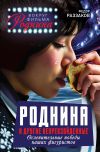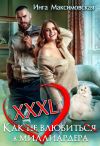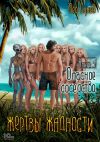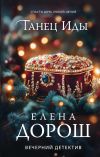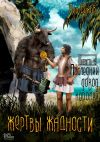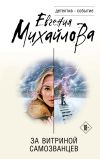Текст книги "Английская коллекция. Уильям Батлер Йейтс. Рассказы о Рыжем Ханрахане / W. B. Yeats. Stories of Red Hanrahan"
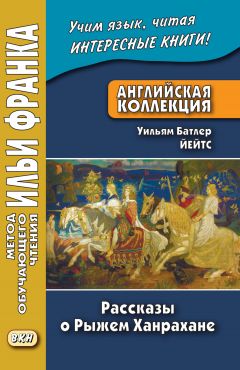
Автор книги: Уильям Йейтс
Жанр: Иностранные языки, Наука и Образование
Возрастные ограничения: +16
сообщить о неприемлемом содержимом
Текущая страница: 2 (всего у книги 9 страниц)
And once Hanrahan said as a man would say in a dream (и как-то сказал Ханрахан, как обычно говорит человек во сне; once – один раз; однажды, некогда), “It is time for me to be going the road (пришло время мне отправляться в дорогу)”; but just then a good card came to him (но тут же ему пришла хорошая карта; just then – в этот самый момент), and he played it out, and all the money began to come to him (и он разыграл ее, и все деньги стали: «начали» стекаться к нему).
neither ['naɪðǝ], anyone ['enɪwʌn], money ['mʌnɪ]
And sometimes the luck would go against a man and he would have nothing left, and then one or another would lend him something, and he would pay it again out of his winnings, for neither good nor bad luck stopped long with anyone.
And once Hanrahan said as a man would say in a dream, “It is time for me to be going the road”; but just then a good card came to him, and he played it out, and all the money began to come to him.
And once he thought of Mary Lavelle, and he sighed (а один раз он подумал о Мэри Лэвелл и вздохнул); and that time his luck went from him, and he forgot her again (но в этот раз удача отвернулась: «ушла» от него, и он снова о ней позабыл; to forget).
But at last the luck went to the old man and it stayed with him (но в конце концов удача перешла к старику и осталась с ним; at last – наконец), and all they had flowed into him (и все, что у них было, утекло к нему: «в него»), and he began to laugh little laughs to himself (а он начал слегка посмеиваться: «начал смеяться маленькими смешками» про себя), and to sing over and over to himself (и напевать раз за разом себе под нос; over and over – снова и снова), “Spades and Diamonds, Courage and Power,” and so on («пики и бубны, храбрость и могущество» и так далее; and so on – и так далее), as if it was a verse of a song (будто это был запев какой-то песенки; verse – стихотворная строка, стих).
once [wʌns], thought [θɔ:t], sigh [saɪ]
And once he thought of Mary Lavelle, and he sighed; and that time his luck went from him, and he forgot her again.
But at last the luck went to the old man and it stayed with him, and all they had flowed into him, and he began to laugh little laughs to himself, and to sing over and over to himself, “Spades and Diamonds, Courage and Power,” and so on, as if it was a verse of a song.
And after a while anyone looking at the men (и спустя некоторое время любой, наблюдающий за этими людьми), and seeing the way their bodies were rocking to and fro (и видящий то, как их тела раскачиваются из стороны в сторону; way /зд./ – способ, манера; to and fro – взад и вперед, туда и сюда), and the way they kept their eyes on the old man’s hands (и то, как они не отрывают взглядов от рук старика; to keep – сохранять, удерживать /прежнее положение/), would think they had drink taken (подумал бы, что они /изрядно/ выпили; to take – брать; есть, пить; drink – питье, напиток), or that the whole store they had in the world was put on the cards (или что все, что у них есть на этом свете, поставлено на карту; whole – целый, весь; store – запас, резерв); but that was not so, for the quart bottle had not been disturbed since the game began (но это было не так, потому что бутыль с квартой /виски/ стояла: «была» нетронутой с того момента, как игра началась; to disturb – приводить в беспорядок; тревожить, беспокоить), and was nearly full yet (и была еще почти полной), and all that was on the game was a few sixpenny bits and shillings (а все, что стояло на кону, – это несколько шестипенсовиков и шиллингов), and maybe a handful of coppers (и, возможно, горстка медных монет; copper – медь; медная монета).
whole [hǝʋl], quart [kwɔ:t], few [fju:]
And after a while anyone looking at the men, and seeing the way their bodies were rocking to and fro, and the way they kept their eyes on the old man’s hands, would think they had drink taken, or that the whole store they had in the world was put on the cards; but that was not so, for the quart bottle had not been disturbed since the game began, and was nearly full yet, and all that was on the game was a few sixpenny bits and shillings, and maybe a handful of coppers.
”You are good men to win and good men to lose,” said the old man (вы, ребята, умеете выигрывать и умеете проигрывать, – сказал старик; good – хороший; умелый, годный), “you have play in your hearts (вы сердцем чувствуете игру: «у вас в сердцах есть игра»).” He began then to shuffle the cards and to mix them, very quick and fast (тут он начал тасовать карты и перемешивать их, очень быстро и проворно; quick – быстрый; проворный, спорый), till at last they could not see them to be cards at all (пока, наконец, они смогли увидеть, что это вообще не карты; at all – нисколько, ничуть), but you would think him to be making rings of fire in the air (а что он, как и вам бы показалось, делает круги из огня в воздухе; to think – думать, мыслить; представлять себе, воображать), as little lads would make them with whirling a lighted stick (как их делают маленькие мальчики, вращая подожженной палкой); and after that it seemed to them that all the room was dark (а после этого им показалось, что во всем помещении темно; room – место, пространство; помещение, комната), and they could see nothing but his hands and the cards (и они не видели: «не могли видеть» ничего, кроме его рук и карт).
shuffle ['ʃʌf(ǝ)l], quick [kwɪk], whirling ['wɜ:lɪŋ]
”You are good men to win and good men to lose,” said the old man, “you have play in your hearts.” He began then to shuffle the cards and to mix them, very quick and fast, till at last they could not see them to be cards at all, but you would think him to be making rings of fire in the air, as little lads would make them with whirling a lighted stick; and after that it seemed to them that all the room was dark, and they could see nothing but his hands and the cards.
And all in a minute a hare made a leap out from between his hands (а всего лишь через мгновенье из его рук выпрыгнул: «сделал прыжок» заяц; between – между), and whether it was one of the cards that took that shape (и была ли это одна из карт, которая приняла такую форму), or whether it was made out of nothing in the palms of his hands (или он возник из ничего в ладонях его рук; to make – делать, изготавливать; создавать), nobody knew (никто не понял; to know – знать, иметь представление; понимать), but there it was running on the floor of the barn (но вот он побежал по полу амбара), as quick as any hare that ever lived (так же быстро, как любой заяц, который когда-либо жил /на свете/).
minute ['mɪnɪt], between [bɪ'twi:n], palm [pɑ:m]
And all in a minute a hare made a leap out from between his hands, and whether it was one of the cards that took that shape, or whether it was made out of nothing in the palms of his hands, nobody knew, but there it was running on the floor of the barn, as quick as any hare that ever lived.
Some looked at the hare, but more kept their eyes on the old man (одни смотрели на зайца, но большинство не отрывало глаз от старика; to keep eye – неотрывно наблюдать, следить /за кем-л., чем-л./), and while they were looking at him a hound made a leap out between his hands (и когда они смотрели на него, из его рук выпрыгнула гончая), the same way as the hare did (точно так же, как это сделал заяц), and after that another hound and another (а за ней – еще одна гончая, и еще одна), till there was a whole pack of them following the hare round and round the barn (покуда целая свора их не /стала/ преследовать зайца по всему амбару; pack – тюк, связка; свора; round and round – кругом, со всех сторон).
The players were all standing up now, with their backs to the boards (все игравшие стояли теперь спиной к доскам), shrinking from the hounds (увертываясь от собак; to shrink – съеживаться, сморщиваться; отскочить, отшатнуться), and nearly deafened with the noise of their yelping (почти оглохшие от их тявканья; noise – шум, гам),
while [waɪl], nearly ['nɪǝlɪ], deafen ['defn]
Some looked at the hare, but more kept their eyes on the old man, and while they were looking at him a hound made a leap out between his hands, the same way as the hare did, and after that another hound and another, till there was a whole pack of them following the hare round and round the barn.
The players were all standing up now, with their backs to the boards, shrinking from the hounds, and nearly deafened with the noise of their yelping,
but as quick as the hounds were they could not overtake the hare (но какими бы быстрыми гончие ни были, им не удавалось догнать зайца), but it went round (а тот бегал по кругу), till at the last it seemed as if a blast of wind burst open the barn door (пока, наконец, как показалось, порыв ветра не распахнул дверь амбара; to burst open – распахнуться), and the hare doubled and made a leap over the boards (заяц сделал петлю и прыгнул через доски; to double – удваивать; делать петли, сбивать со следа /о звере/; leap – прыжок) where the men had been playing (где = на которых перед этим играли мужчины), and went out of the door and away through the night (выбежал за дверь и /помчался/ прочь сквозь темноту; night – ночь; темнота, мрак), and the hounds over the boards and through the door after it (а собаки, /перепрыгивая/ через доски, сквозь дверной проем /бросились/ за ним; door – дверь; дверной проем).
Then the old man called out (тут старик закричал), “Follow the hounds, follow the hounds, and it is a great hunt you will see tonight (следуйте за псами, и этой ночью вы увидите знатную травлю; great – большой, огромный; замечательный, восхитительный),” and he went out after them (и он выбежал за ними).
double ['dʌbl], door [dɔ:], great [ɡreɪt]
but as quick as the hounds were they could not overtake the hare, but it went round, till at the last it seemed as if a blast of wind burst open the barn door, and the hare doubled and made a leap over the boards where the men had been playing, and went out of the door and away through the night, and the hounds over the boards and through the door after it.
Then the old man called out, “Follow the hounds, follow the hounds, and it is a great hunt you will see tonight,” and he went out after them.
But used as the men were to go hunting after hares (но как ни привычны были эти люди к травле зайцев), and ready as they were for any sport (и как ни готовы к любой забаве), they were in dread to go out into the night (они побоялись выйти в ночь; to be in dread – испытывать страх), and it was only Hanrahan that rose up and that said (и один лишь Ханрахан поднялся и так сказал; to rise), “I will follow, I will follow on (я последую /за ними/; on – вперед).”
“You had best stop here, Hanrahan (тебе бы лучше остаться здесь, Ханрахан),” the young man that was nearest him said (сказал молодой парень, что был ближе всех к нему: «ближайший к нему»), “for you might be going into some great danger (иначе ты можешь подвергнуться какой-нибудь серьезной опасности; to go – подвергаться /чему-л./).”
were [wɜ:], dread [dred], great [ɡreɪt]
But used as the men were to go hunting after hares, and ready as they were for any sport, they were in dread to go out into the night, and it was only Hanrahan that rose up and that said, “I will follow, I will follow on.”
“You had best stop here, Hanrahan,” the young man that was nearest him said, “for you might be going into some great danger.”
But Hanrahan said, “I will see fair play, I will see fair play (но Ханрахан сказал: «Я увижу славную забаву»; fair – красивый, прекрасный /арх., поэт./)”, and he went stumbling out of the door like a man in a dream (и он пошел, спотыкаясь, через дверь, как человек во сне; to stumble – спотыкаться), and the door shut after him as he went (и дверь закрылась за ним, когда он вышел).
He thought he saw the old man in front of him (ему почудилось, что он видит старика перед собой), but it was only his own shadow (но то была лишь его собственная тень) that the full moon cast on the road before him (которую полная луна отбрасывала на дорогу перед ним), but he could hear the hounds (но он слышал: «мог слышать» гончих) crying after the hare over the wide green fields of Granagh (с лаем /мчащихся/ за зайцем по широким зеленым полям Гранага; to cry – кричать; выть, лаять /о животных/), and he followed them very fast (и он весьма быстро следовал за ними) for there was nothing to stop him (ибо не было ничего, что останавливало бы его);
fair [feǝ], shadow ['ʃædǝʋ], field [fi:ld]
But Hanrahan said, “I will see fair play, I will see fair play,” and he went stumbling out of the door like a man in a dream, and the door shut after him as he went.
He thought he saw the old man in front of him, but it was only his own shadow that the full moon cast on the road before him, but he could hear the hounds crying after the hare over the wide green fields of Granagh, and he followed them very fast for there was nothing to stop him;
and after a while he came to smaller fields (и через некоторое время он достиг полей поменьше) that had little walls of loose stones around them (которые были огорожены невысокими стенами: «которые имели маленькие стены» из незакрепленных камней), and he threw the stones down as he crossed them (и он сбрасывал камни вниз = камни скатывались вниз из-под его ног, когда он перелезал через них; to throw; to cross – пересекать, переходить /через что-л./), and did not wait to put them up again (и не останавливался: «не дожидался», чтобы поднять их снова; to put up – поднимать); and he passed by the place where the river goes under ground at Ballylee (и прошел он мимо того места, где река протекает под землей у /замка/ Бэллили), and he could hear the hounds going before him up towards the head of the river (и он слышал, что собаки бегут впереди него по направлению к верховью реки; head – голова; верховье /реки/).
while [waɪl], again [ǝ'ɡen, ǝ'ɡeɪn], towards [tǝ'wɔ:dz]
and after a while he came to smaller fields that had little walls of loose stones around them, and he threw the stones down as he crossed them, and did not wait to put them up again; and he passed by the place where the river goes under ground at Ballylee, and he could hear the hounds going before him up towards the head of the river.
Soon he found it harder to run, for it was uphill he was going (вскоре он обнаружил, что бежать /стало/ труднее, поскольку он двигался на подъем; to find – находить, отыскивать; обнаруживать), and clouds came over the moon (и тучи наползли на луну), and it was hard for him to see his way (и ему трудно было различать: «видеть» дорогу), and once he left the path to take a short cut (и один раз он оставил тропу, чтобы срезать путь; to take a short cut – срезать путь; cut – порез, разрез; путь напрямик), but his foot slipped into a boghole and he had to come back to it (но его нога соскользнула в болотину, и ему пришлось вернуться на нее = на тропу; bog – болото, трясина; hole – дыра, отверстие; яма, впадина). And how long he was going he did not know, or what way he went (и как долго он бежал и по какой дороге, он не знал), but at last he was up on the bare mountain (но, наконец, он поднялся на /совершенно/ голую гору), with nothing but the rough heather about him (/где не было/ ничего, кроме жесткого вереска вокруг него), and he could neither hear the hounds nor any other thing (и он не слышал ни гончих, ни каких-то других звуков; thing – вещь, предмет; нечто, что-то).
cloud [klaʋd], boghole [,bǝʋɡ'hǝʋl], heather ['heðǝ]
Soon he found it harder to run, for it was uphill he was going, and clouds came over the moon, and it was hard for him to see his way, and once he left the path to take a short cut, but his foot slipped into a boghole and he had to come back to it. And how long he was going he did not know, or what way he went, but at last he was up on the bare mountain, with nothing but the rough heather about him, and he could neither hear the hounds nor any other thing.
But their cry began to come to him again (но вот их лай снова начал доноситься до него; to come – приходить; доходить, достигать), at first far off and then very near (сначала издалека, а потом /откуда-то/ очень близко; far off – вдали), and when it came quite close to him (и когда он раздался совсем рядом с ним), it went up all of a sudden into the air (то вдруг поднялся в воздух; all of a sudden – внезапно, вдруг), and there was the sound of hunting over his head (и звуки охоты /теперь/ были у него над головой); then it went away northward (потом они /стали/ удаляться на север) till he could hear nothing more at all (до тех пор, пока он вообще не смог ничего больше расслышать). “That’s not fair,” he said, “that’s not fair (ничуть это не славно, – сказал он).” And he could walk no longer (идти он больше не мог), but sat down on the heather where he was (а сел на вереск прямо там, где стоял: «где он был»), in the heart of Slieve Echtge (в /самом/ сердце Слив-Эхтге; Slieve Echtge – горная гряда в графствах Голуэй и Клэр), for all the strength had gone from him (поскольку все силы оставили его), with the dint of the long journey he had made (вместе с впечатлениями от долгого путешествия, которое он проделал; dint – след, вмятина /от удара/; отпечаток).
cry [kraɪ], quite [kwaɪt], northward ['nɔ:θwǝd]
But their cry began to come to him again, at first far off and then very near, and when it came quite close to him, it went up all of a sudden into the air, and there was the sound of hunting over his head; then it went away northward till he could hear nothing more at all. “That’s not fair,” he said, “that’s not fair.” And he could walk no longer, but sat down on the heather where he was, in the heart of Slieve Echtge, for all the strength had gone from him, with the dint of the long journey he had made.
And after a while he took notice that there was a door close to him (спустя некоторое время он заметил, что рядом с ним находится какая-то дверь; to take notice – замечать), and a light coming from it (и из нее льется свет), and he wondered that being so close to him he had not seen it before (и он удивился, что /хотя она/ находится так близко от него, он не видел = не замечал ее прежде). And he rose up, and tired as he was he went in at the door (он поднялся и, хотя был уставшим: «/будучи таким/ уставшим, каким он был», вошел в эту дверь), and although it was night time outside (и несмотря на то, что снаружи стояла ночная пора), it was daylight he found within (внутри он обнаружил дневной свет). And presently he met with an old man (и тотчас же ему повстречался старик; to meet) that had been gathering summer thyme and yellow flag-flowers (который собирал /растущие/ летом тимьян и желтые ирисы), and it seemed as if all the sweet smells of the summer were with them (и казалось, будто с ними были = от них исходили все сладкие запахи лета).
notice ['nǝʋtɪs], daylight ['deɪlaɪt], thyme [taɪm]
And after a while he took notice that there was a door close to him, and a light coming from it, and he wondered that being so close to him he had not seen it before. And he rose up, and tired as he was he went in at the door, and although it was night time outside, it was daylight he found within. And presently he met with an old man that had been gathering summer thyme and yellow flag-flowers, and it seemed as if all the sweet smells of the summer were with them.
And the old man said (и старик сказал): “It is a long time you have been coming to us (долгое же время ты шел к нам), Hanrahan the learned man and the great songmaker (Ханрахан, ученый человек и великий сочинитель песен).”
And with that he brought him into a very big shining house (и с этими /словами/ он отвел его в очень большой светящийся дом), and every grand thing Hanrahan had ever heard of (и все великолепные вещи, о которых он когда-либо слышал; every – каждый, всякий; grand – большой, величественный; великолепный, роскошный), and every colour he had ever seen (и все цвета, которые он когда-либо видел), were in it (были в нем). There was a high place at the end of the house (в конце дома находилось возвышение: «высокое место»), and on it there was sitting in a high chair a woman (и на нем сидела в высоком кресле женщина), the most beautiful the world ever saw (самая прекрасная, какую когда-либо видел мир), having a long pale face and flowers about it (у /нее/ было длинное бледное лицо, а вокруг него – цветы), but she had the tired look of one that had been long waiting (но вид она имела усталый, как у того, кто долго ждал).
brought [brɔ:t], colour ['kʌlǝ], beautiful ['bju:tɪfl]
And the old man said: “It is a long time you have been coming to us, Hanrahan the learned man and the great songmaker.”
And with that he brought him into a very big shining house, and every grand thing Hanrahan had ever heard of, and every colour he had ever seen, were in it. There was a high place at the end of the house, and on it there was sitting in a high chair a woman, the most beautiful the world ever saw, having a long pale face and flowers about it, but she had the tired look of one that had been long waiting.
And there were sitting on the step below her chair four grey old women (а на ступеньке ниже ее кресла сидели четыре седые старухи; grey – серый; седой), and the one of them was holding a great cauldron in her lap (и одна из них держала огромный котел у себя на подоле; lap – колени /сидящего человека/; подол); and another a great stone on her knees (а другая – огромный камень у себя на коленях), and heavy as it was it seemed light to her (и хотя он и был тяжелым, для нее он казался легким); and another of them had a very long spear (а еще у одной из них было очень длинное копье) that was made of pointed wood (которое было сделано из заостренного дерева); and the last of them had a sword that was without a scabbard (а у последней из них был меч, но без ножен). Red Hanrahan stood looking at them for a long Hanrahan-time (Рыжий Ханрахан стоял и смотрел на них долгое, /по меркам самого/ Ханрахана, время), but none of them spoke any word to him or looked at him at all (но ни одна из них не произнесла ни слова и вообще не взглянула на него).
cauldron ['kɔ:ldrǝn], knees [ni:z], sword [sɔ:d]
And there were sitting on the step below her chair four grey old women, and the one of them was holding a great cauldron in her lap; and another a great stone on her knees, and heavy as it was it seemed light to her; and another of them had a very long spear that was made of pointed wood; and the last of them had a sword that was without a scabbard. Red Hanrahan stood looking at them for a long Hanrahan-time, but none of them spoke any word to him or looked at him at all.
And he had it in his mind to ask (и он намеревался спросить; to have in mind – намереваться /что-л. сделать/) who that woman in the chair was, that was like a queen (кто такая эта женщина в кресле, что /так/ похожа на королеву), and what she was waiting for (и чего она ожидает); but ready as he was with his tongue and afraid of no person (но хоть он и был остер на язык и не боялся никого; ready tongue – хорошо подвешенный язык), he was in dread now to speak to so beautiful a woman (теперь ему стало страшно заговорить с такой прекрасной женщиной), and in so grand a place (и в таком величественном месте). And then he thought to ask what were the four things (а потом он решил спросить, что это за четыре предмета; to think – думать; намереваться, замышлять) the four grey old women were holding like great treasures (которые четыре седые старухи держали, словно величайшие сокровища), but he could not think of the right words to bring out (но он не смог придумать = подобрать подходящие слова, чтобы сказать это; to bring out – произносить, высказывать).
chair [tʃeǝ], tongue [tʌŋ], treasure ['treʒǝ]
And he had it in his mind to ask who that woman in the chair was, that was like a queen, and what she was waiting for; but ready as he was with his tongue and afraid of no person, he was in dread now to speak to so beautiful a woman, and in so grand a place. And then he thought to ask what were the four things the four grey old women were holding like great treasures, but he could not think of the right words to bring out.
Then the first of the old women rose up (тут первая из старух поднялась; to rise), holding the cauldron between her two hands (держа котел в руках: «между своими двумя руками»), and she said “Pleasure,” and Hanrahan said no word (и она сказала: «Отрада», а Ханрахан не сказал ни слова). Then the second old woman rose up with the stone in her hands, and she said “Power” (затем вторая старуха поднялась с камнем в руках и сказала: «Могущество»); and the third old woman rose up with the spear in her hand, and she said “Courage” (и третья старуха поднялась с копьем в руке и сказала: «Храбрость»); and the last of the old women rose up having the sword in her hands, and she said “Knowledge” (и последняя из старух поднялась, держа меч в руках, и сказала: «Знание»). And everyone, after she had spoken, waited as if for Hanrahan to question her (и каждая, после того, как высказалась, ждала, спросит ли Ханрахан ее), but he said nothing at all (но он не сказал вообще ничего).
third [θɜ:d], courage ['kʌrɪdʒ], knowledge ['nɒlɪdʒ]
Then the first of the old women rose up, holding the cauldron between her two hands, and she said “Pleasure,” and Hanrahan said no word. Then the second old woman rose up with the stone in her hands, and she said “Power”; and the third old woman rose up with the spear in her hand, and she said “Courage”; and the last of the old women rose up having the sword in her hands, and she said “Knowledge.” And everyone, after she had spoken, waited as if for Hanrahan to question her, but he said nothing at all.
And then the four old women went out of the door (и тогда эти четыре старухи вышли за дверь), bringing their four treasures with them (унося свои четыре сокровища с собой), and as they went out one of them said (и когда они выходили, одна из них сказала), “He has no wish for us (у него нет нужды в нас; wish – желание; потребность)”; and another said, “He is weak, he is weak” (а другая сказала: «Он слаб, он слаб»); and another said, “He is afraid” (и еще одна сказала: «Он напуган»); and the last said, “His wits are gone from him (а последняя сказала: «Разум покинул его»).” And then they all said (а затем они все сказали) “Echtge, daughter of the Silver Hand, must stay in her sleep (Эхтге, дочь Серебряной Руки, будет продолжать спать: «должна оставаться в своем сне»; to stay – оставаться, не уходить; оставаться /в каком-л. положении, состоянии/). It is a pity, it is a great pity (жаль, ужасно жаль: «жалость, огромная жалость»).”
And then the woman that was like a queen gave a very sad sigh (и тут женщина, которая была похожа на богиню, очень грустно вздохнула: «издала очень грустный вздох»), and it seemed to Hanrahan as if the sigh had the sound in it of hidden streams (и, как показалось Ханрахану, в этом вздохе слышался шум скрытых водных потоков);
daughter ['dɔ:tǝ], sigh [saɪ], sound [saʋnd]
And then the four old women went out of the door, bringing their four treasures with them, and as they went out one of them said, “He has no wish for us”; and another said, “He is weak, he is weak”; and another said, “He is afraid”; and the last said, “His wits are gone from him.” And then they all said “Echtge, daughter of the Silver Hand, must stay in her sleep. It is a pity, it is a great pity.”
And then the woman that was like a queen gave a very sad sigh, and it seemed to Hanrahan as if the sigh had the sound in it of hidden streams;
and if the place he was in had been ten times grander and more shining than it was (и /даже/ если бы место, в котором он находился, стало в десять раз более величественным и более сияющим, чем было), he could not have hindered sleep from coming on him (он не мог бы помешать сну овладеть собой; to come on /зд./ – наступать, надвигаться); and he staggered like a drunken man and lay down there and then (и он зашатался, словно пьяный, и тут же повалился наземь; there and then – тотчас же, на месте: «там и тогда»).
When Hanrahan awoke, the sun was shining on his face (когда Ханрахан проснулся, солнце сияло ему в лицо; to awake), but there was white frost on the grass around him (но на траве вокруг него был белый иней; frost – мороз; иней), and there was ice on the edge of the stream he was lying by (и лед был по краям речки, возле которой он лежал), and that goes running on through Daire-caol and Druim-da-rod (и которая течет через Дайр-кэол и Друим-да-род; to run – бежать, бегать; течь, струиться).
drunken ['drʌŋk(ǝ)n], shine [ʃaɪn], grass [ɡrɑ:s]
and if the place he was in had been ten times grander and more shining than it was, he could not have hindered sleep from coming on him; and he staggered like a drunken man and lay down there and then.
When Hanrahan awoke, the sun was shining on his face, but there was white frost on the grass around him, and there was ice on the edge of the stream he was lying by, and that goes running on through Daire-caol and Druim-da-rod.
He knew by the shape of the hills and by the shining of Lough Greine in the distance (он понял по форме холмов и по блеску /поверхности/ Лох-Грейн вдали) that he was upon one of the hills of Slieve Echtge (что находится на одном из холмов Слив-Эхтге), but he was not sure how he came there (но он и понятия не имел: «не был уверен», как добрался туда); for all that had happened in the barn had gone from him (поскольку все, что произошло в амбаре, пропало из его /памяти/), and all of his journey but the soreness of his feet and the stiffness in his bones (и все, /связанное/ с его путешествием, кроме боли в ногах и одеревенения в костях; stiffness – жесткость; скованность).
It was a year after that (год спустя после этого), there were men of the village of Cappaghtagle sitting by the fire in a house on the roadside (четверо мужчин из деревеньки Каппахтагл сидели у огня в доме у дороги; roadside – обочина, край дороги), and Red Hanrahan that was now very thin and worn (и Рыжий Ханрахан, который теперь был очень худ и изможден; thin – тонкий; худой; worn – изношенный; усталый, изнуренный) and his hair very long and wild (а волосы его /были/ очень длинны и спутаны; wild – дикий, дикорастущий; растрепанный, в беспорядке /разг./), came to the half-door and asked leave to come in and rest himself (подошел к двустворчатой двери и попросил позволения войти и отдохнуть; half-door – двустворчатая дверь);
